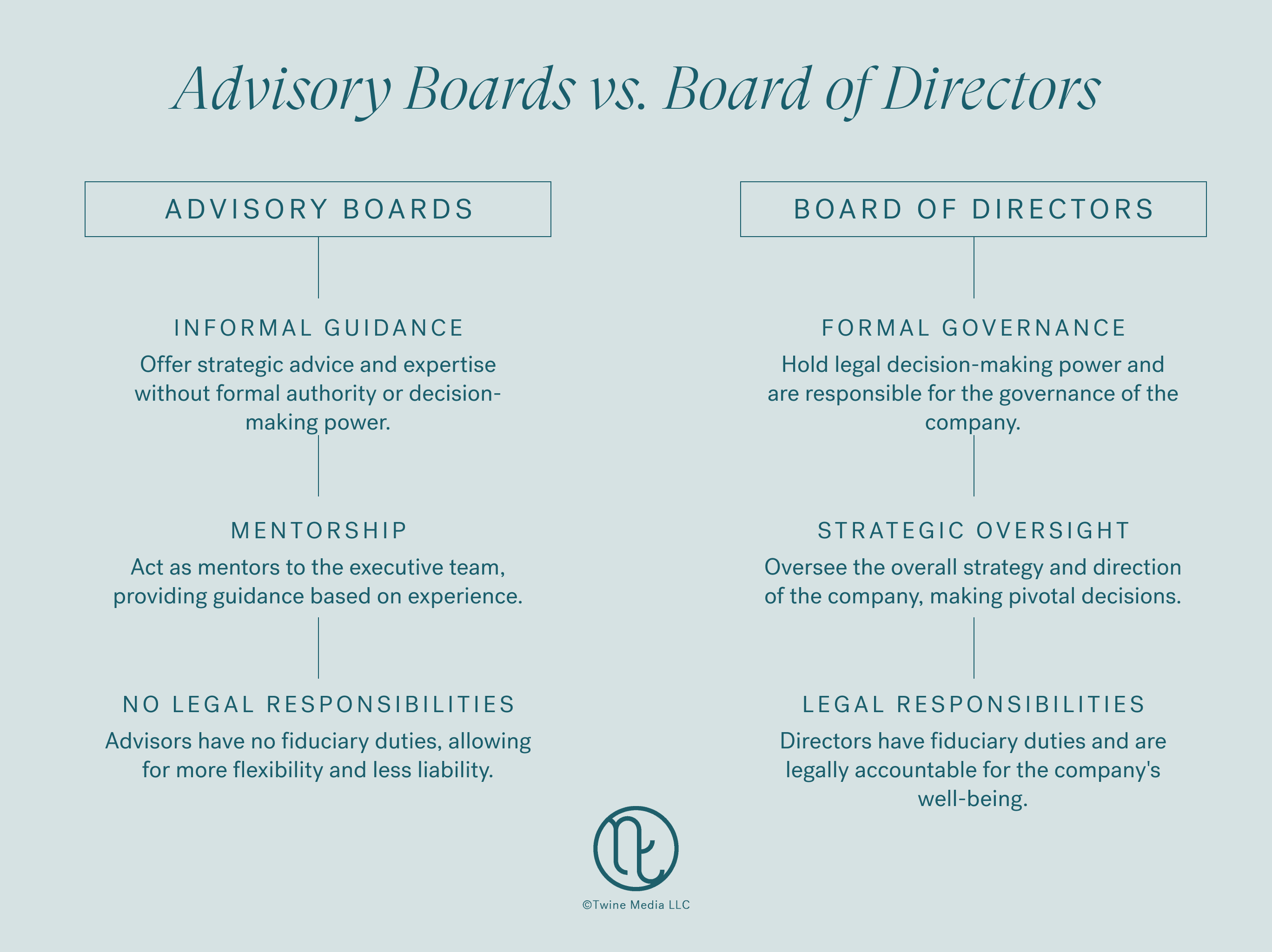Entrepreneurship is challenging, and it’s important to think through the people and groups who will be most critical in helping you navigate important decisions in driving your business strategy. Understanding the nuances of corporate governance will help you determine what support structure makes sense for your business, at the right time
The two most common company support structure entities are Advisory Boards and Boards of Directors. While they might sound similar, they play distinctly different but equally important roles in a company.
While Advisory Boards offer informal guidance and mentorship, Boards of Directors bring in formal governance and oversight. Choosing the right people for these roles, managing the relationship effectively, and ensuring they complement your business’s evolving needs are crucial steps in leveraging their full potential.
Advisory Boards: Your Informal Navigators
In the early stages of your business, you might find yourself seeking informal advice from experienced professionals. This is where Advisory Boards come into play. Think of them as a team of mentors, offering guidance without the formalities and legal responsibilities of a Board of Directors. Their role is more about providing insights and advice rather than governance.
In the early days of building my company, I sought out advisors who had prior experience scaling businesses in the prestige beauty industry. Their knowledge of the unique market dynamics, insights into the retail landscape and understanding the legal nuances of manufacturing helped me navigate through the uncertainties of starting a new venture.
Board of Directors: The Official Governing Body
As your company grows, you might find the need to formalize these advisory roles and transition into a Board of Directors. This change often coincides with acquiring investors or reaching a certain scale in operations.
A Board of Directors has legal responsibilities and provides more formal governance and oversight structure for your business. A board helps ensure that your company is on track with its financial goals, legal obligations, and overall strategic direction.
As your company evolves, so do its needs. A Board of Directors brings a level of rigor and scrutiny that is essential for a maturing business. In my experience, a board has been instrumental in strategic decision-making, offering not just advice but also making crucial introductions that have propelled my company forward.

Choosing the Right People
Selecting the right individuals is critical, whether it’s for an Advisory Board or a Board of Directors. Look for people who bring diverse, yet relevant, industry experience and complementary skill sets. They should be individuals who can challenge you, offer new perspectives, and open doors to new opportunities: For example, having someone from the tech industry on my Advisory Board offered us insights into digital marketing strategies that we hadn’t considered before, which was impactful in helping us navigate early challenges with driving brand awareness to support our retail business.
Managing the Relationship
Managing the relationship with your board is a delicate art. Boards exist to advise and guide, not to run the day-to-day operations. It’s important to set clear expectations about the level of involvement you expect right from the start. Effective communication is key and you should consider setting a framework for sharing regular company updates versus more structured, in-depth meetings. During these meetings, it’s important to be receptive to feedback and learn how to tailor what feedback should be implemented versus solely considered. I always made sure to keep my Advisory Board updated on both our progress and challenges. This not only kept them engaged but also created a level of trust and transparency, while ensuring that their advice was timely and relevant.
Ensuring They Don’t Overstep
While board members are highly valuable, it’s important to ensure they don’t overstep their bounds. Their role is to support and guide not to interfere with the day-to-day management. Maintaining this boundary is important in maintaining your autonomy as an entrepreneur.
I’ve found that setting agendas for meetings and clearly outlining the areas where I needed input the most helped in keeping the discussions focused and helped prevent any overstepping.
The Evolution of Your Boards
As your business grows, the composition of your board might need to evolve too. The skills and experiences that were relevant in the early stages might differ from what you need in later stages. Being open to bringing in new members and occasionally rotating out others is part of maintaining a board that is aligned with your company’s current needs.
“These boards are not just a requirement – they are a resource.” – Nancy Twine
Boards can offer the insights, guidance, and support you need to steer your company towards success. In the world of entrepreneurship, you’re never alone. There are experienced individuals ready to offer their knowledge and support.
What challenges have you faced in setting up your Advisory Board or Board of Directors, and how did you overcome them? Share your experiences in the comments!




